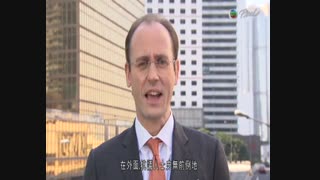Hong Kong review 2014
2014-12-30
1
"2014 was a year of political reform. From the start, the government continued its consultation on the 2017 Chief Executive election. Many groups submitted proposals. In a June 22nd referendum, nearly 800,000 voted for real universal suffrage formulas which included public nomination. Pro-Beijing forces claim they were open to discussions with pan democrats. But the two sides argued over international standards for universal suffrage. The central and SAR governments insisted they must abide by the Basic Law's requirement for a broadly representative nomination committee to pick candidates for Chief Executive and that public nomination violated the mini constitution. On August 31st, the National People's Congress Standing Committee decided on a strict framework to allow only 2 to 3 hopefuls for CE, who must get over 50% of the nomination Committee's backing. This precipitated a civil disobedience movement that has ravaged HK society"--TVB's website.
"A university students' class boycott starting September 22 led to the early launch of Occupy Central. On September28, police fired 87 rounds of teargas, instigating citizens to commandeer the hubs of Admiralty, Causeway Bayand Mongkok. As people's lives continued to be disrupted, the occupy movement was vilified and occupiers suffered physical attacks in sustained street skirmishes. Dialogue between government and students went nowhere. Students insisted on public nomination, the government proposed submitting a report of the situation to Beijing. A proposed referendum in Admiralty's occupied zone petered out. Students were forced to abort a trip to Beijing. The occupy movement stalled. At the end of November, students'attempt to attack government headquarters failed. The Occupy Central trio and others surrendered, hoping to end the impasse"--TVB's website.
"Fights on the streets spilt into LegCo chambers. Filibustering lawmakers delayed debate on many issues. Butfunding for preliminary works in northeast New Territorieswas allocated. Citizens' lives were disrupted often by a faulty MTR signaling system. Delays in building the high speed rail upped the bill by $6.5 billion. Acrimony between Hong Kongers and mainlanders persisted"--TVB's website.
"2014 was the news media's darkest year. Early on, Commercial Radio suddenly terminated the contract of host Lee Wai-ling. Ming Pao's former Chief Editor Kevin Lau wasstabbed 6 times. Many reporters covering the occupy movement were attacked and injured. Also the corruption trial of former Chief Secretary Rafael Hui and Sun Hung Kai Properties' Kwok brothers was held. Chief Executive Leung Chun-ying's acceptance of a huge sum from UGL was exposed, as were Jimmy Lai's contributions to pan democrats. And further developments in the Manila hostage and Lamma Island fatal cases"--TVB's website.
"A university students' class boycott starting September 22 led to the early launch of Occupy Central. On September28, police fired 87 rounds of teargas, instigating citizens to commandeer the hubs of Admiralty, Causeway Bayand Mongkok. As people's lives continued to be disrupted, the occupy movement was vilified and occupiers suffered physical attacks in sustained street skirmishes. Dialogue between government and students went nowhere. Students insisted on public nomination, the government proposed submitting a report of the situation to Beijing. A proposed referendum in Admiralty's occupied zone petered out. Students were forced to abort a trip to Beijing. The occupy movement stalled. At the end of November, students'attempt to attack government headquarters failed. The Occupy Central trio and others surrendered, hoping to end the impasse"--TVB's website.
"Fights on the streets spilt into LegCo chambers. Filibustering lawmakers delayed debate on many issues. Butfunding for preliminary works in northeast New Territorieswas allocated. Citizens' lives were disrupted often by a faulty MTR signaling system. Delays in building the high speed rail upped the bill by $6.5 billion. Acrimony between Hong Kongers and mainlanders persisted"--TVB's website.
"2014 was the news media's darkest year. Early on, Commercial Radio suddenly terminated the contract of host Lee Wai-ling. Ming Pao's former Chief Editor Kevin Lau wasstabbed 6 times. Many reporters covering the occupy movement were attacked and injured. Also the corruption trial of former Chief Secretary Rafael Hui and Sun Hung Kai Properties' Kwok brothers was held. Chief Executive Leung Chun-ying's acceptance of a huge sum from UGL was exposed, as were Jimmy Lai's contributions to pan democrats. And further developments in the Manila hostage and Lamma Island fatal cases"--TVB's website.







